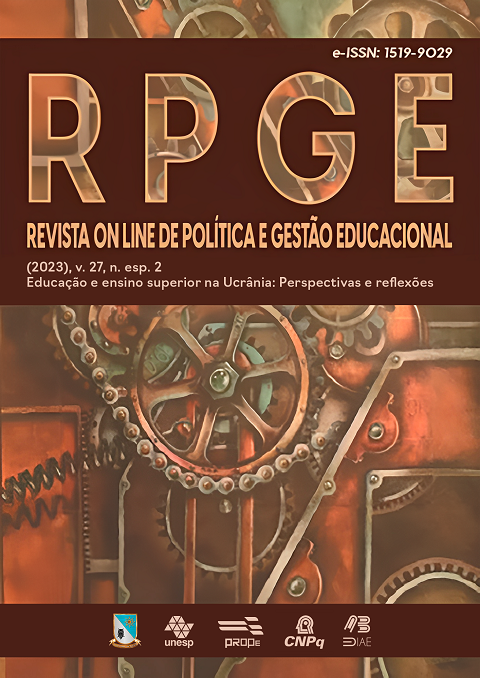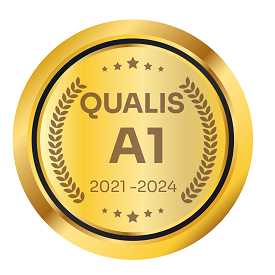Análisis teórico y metodológico de los fenómenos educativos modernos
Gamificación, digitalización
DOI:
https://doi.org/10.22633/rpge.v27iesp.2.18383Palabras clave:
Espacio educativo digital, Gamificación en educación, Estrategias educativas, Innovación en educación, Educación 4.0Resumen
El posicionamiento de los segmentos digital y del juego como fenómenos educativos es una cuestión urgente que requiere un análisis teórico y metodológico. El objetivo del artículo es destacar las características de la gamificación y la digitalización en el contexto del desarrollo innovador de la educación. La tarea de exploración científica se centra en la armonización de los elementos digitales y de juego en la formación del paradigma educativo moderno. La metodología de investigación se centró en el potencial del discurso metodológico científico general (análisis, sistematización, previsión) y el discurso científico y pedagógico (conceptualización, modelización). Los resultados indican que los componentes digitales y de juego constituyen la dimensión innovadora de las estrategias educativas. Al mismo tiempo, se distinguen dos formas de conciliar los componentes clave del espacio educativo: innovación y tradicionalismo e innovación frente a tradicionalismo. Por consiguiente, la gamificación y la digitalización son los factores que determinan la proporción de componentes tradicionales e innovadores en las estrategias de desarrollo educativo.
Descargas
Citas
AINI, Q. et al. Digitalization of Smart Student Assessment Quality in Era 4.0. International Journal of Advanced Trends in Computer Science and Engineering, v. 9, n. 1-2, p. 257-265, 2020. DOI: 10.30534/ijatcse/2020/3891.22020.
BADER, S.; OLEKSIIENKO, A.; MERENIUK, K. Digitalization of future education: analysis of risks on the way and selection of mechanisms to overcome barriers (Ukrainian experience). Futurity Education, v. 2, n. 2, p. 21–33, 2022. DOI: 10.57125/FED/2022.10.11.26.
BAKHMAT, N. et al. Modernization of future teachers’ professional training: on the role of immersive technologies. Futurity Education, v. 2, n. 1, p. 28–37, 2022. DOI: 10.57125/FED/2022.10.11.22.
BALYER, A.; ÖZ, Ö. Academicians’ views on digital transformation in education. International Online Journal of Education and Teaching (IOJET), v. 5, n. 4, p. 809–830, 2018. DOI: 10.33168/iojet.441295.
BENAVIDES, L. et al. Digital Transformation in Higher Education Institutions: A Systematic Literature Review. Sensors, v. 20, p. 3291, 2020. DOI: 10.3390/s20113291.
BYGSTAD, B. et al. From dual digitalization to digital learning space: Exploring the digital transformation of higher education. Computers & Education, v. 182, p. 104463, 2022. DOI: 10.1016/j.compedu.2022.104463.
CATAL, C.; TEKINERDOGAN, B. Aligning Education for the Life Sciences Domain to Support Digitalization and Industry 4.0. Procedia Computer Science, v. 158, p. 99–106, 2019. DOI: 10.1016/j.procs.2019.09.032.
DA MOTTA REIS, J. S. et al. Education 4.0: Gaps Research Between School Formation and Technological Development. In: LATIFI, S. (org.). 17th International Conference on Information Technology–New Generations (ITNG 2020). Advances in Intelligent Systems and Computing. Cham: Springer, 2020. p. 1134. 2020. DOI: 10.1007/978-3-030-43020-7_55.
FILIPOVA, M.; USHEVA, M. Social and labor relations of the digital age: to the question of future education development. Futurity Education, v. 1, n. 2, p. 14–22, 2021. DOI: 10.32674/feduc.v1i2.39.
HAKAK, S. et al. Cloud-assisted gamification for education and learning – Recent advances and challenges. Computers & Electrical Engineering, v. 74, p. 22–34, 2019. DOI: 10.1016/j.compeleceng.2019.01.002.
HALLIFAX, S. et al. Adaptive Gamification in Education: A Literature Review of Current Trends and Developments. In: SCHEFFEL, M. et al. (org.). Transforming Learning with Meaningful Technologies. EC-TEL 2019. Lecture Notes in Computer Science. Cham: Springer, 2019. p. 11722. 2019. DOI: 10.1007/978-3-030-29736-7_22.
HANDAYANI TYAS, E.; NAIBAHO, L. Hots learning model improves the quality of education. International Journal of Research – GRANTHAALAYAH, v. 9, n. 1, p. 176–182, 2021. DOI: 10.29121/granthaalay ah.v9.i1.2021.3100.
HANS, V. B.; CRASTA, S. J. Digitalization in the 21st century: impact on learning and doing. Journal of Global Economy, v. 15, n. 1, p. 12–23, 2019. DOI: 10.1956/jge.v15i1.524.
HUANG, R. et al. The impact of gamification in educational settings on student learning outcomes: a meta-analysis. Educational Technology Research and Development, v. 68, p. 1875–1901, 2020. DOI: 10.1007/s11423-020-09807-z.
JACKSON, N. C. Managing for competency with innovation change in higher education: Examining the pitfalls and pivots of digital transformation. Business Horizons, v. 22, n. 6, p. 761–772, 2019. DOI: 10.1016/j.bushor.2019.08.002.
LUO, Z. Gamification for educational purposes: What are the factors contributing to varied effectiveness? Education and Information Technologies, v. 27, p. 891–915, 2022. DOI: 10.1007/s10639-021-10642-9.
MANZANO-LEÓN, A. et al. Between Level Up and Game Over: A Systematic Literature Review of Gamification in Education. Sustainability, v. 13, n. 4, p. 2247, 2021. DOI: 10.3390/su13042247.
MERTALA, P. Paradoxes of participation in the digitalization of education: a narrative account. Learning, Media and Technology, v. 45, n. 2, p. 179–192, 2020. DOI: 10.1080/17439884.2020.1696362.
OFOSU-AMPONG, K. The Shift to Gamification in Education: A Review on Dominant Issues. Journal of Educational Technology Systems, v. 49, n. 1, p. 113–137, 2020. DOI: 10.1177/0047239520917629.
OLIVEIRA, K.; DE SOUZA, R. A. C. Digital Transformation towards Education 4.0. Informatics in Education, v. 21, n. 2, p. 283–309, 2022. DOI: 10.15388/infedu.2022.13.
OLIVEIRA, W. et al. Tailored gamification in education: A literature review and future agenda. Education and Information Technologies, v. 28, p. 373-406, 2022. DOI: 10.1007/s10639-022-11122-4.
PALOMINO, P. T. et al. Narrative for Gamification in Education: Why Should you Care? In: INTERNATIONAL CONFERENCE ON ADVANCED LEARNING TECHNOLOGIES, 19., 2012, Maceió. Proceedings […]. [S. l.]: [s. d.], 2019. p. 97–99. DOI: 10.1109/ICALT.2019.00035.
PETTERSSON, F. Understanding digitalization and educational change in school by means of activity theory and the levels of learning concept. Education and Information Technologies, v. 26, p. 187–204, 2021. DOI: 10.1007/s10639-020-10239-8.
SARKER, N.I.S. et al. Leveraging Digital Technology for Better Learning and Education: A Systematic Literature Review. International Journal of Information and Education Technology, v. 9, n. 7, 2019. DOI: 10.18178/ijiet.2019.9.7.1246.
SCHMIDT, J. T.; TANG, M. Digitalization in Education: Challenges, Trends and Transformative Potential. In: HARWARDT, M. et al. (org.). Führen und Managen in der digitalen Transformation. Wiesbaden: Springer Gabler, 2019. DOI: 10.1007/978-3-658-28670-5_16.
SWACHA, J. State of Research on Gamification in Education: A Bibliometric Survey. Education Sciences, v. 11, n. 2, p. 69, 2021. DOI: 10.3390/educsci11020069.
TELUKDARIE, A.; MUNSAMY, M. Digitization of Higher Education Institutions. In: INTERNATIONAL CONFERENCE ON INDUSTRIAL ENGINEERING AND ENGINEERING MANAGEMENT, 2019, Macao. Proceedings […]. [S. l.]: [s. d.], 2019. p. 716–721. DOI: 10.1109/IEEM44572.2019.8978701.
TODA, A. M. et al. A Taxonomy of Game Elements for Gamification in Educational Contexts: Proposal and Evaluation. In: INTERNATIONAL CONFERENCE ON ADVANCED LEARNING TECHNOLOGIES,19., 2019, Maceió. Proceedings […]. [S. l.]: [s. d.], 2019. p. 84–88. DOI: 10.1109/ICALT.2019.00028.
TSEKHMISTER, Y. V. et al. Evaluation of Virtual Reality Technology and Online Teaching System for Medical Students in Ukraine During COVID-19 Pandemic. International Journal of Emerging Technologies in Learning (iJET), v. 16, n. 23, p. 127–139, 2021. DOI: 10.3991/ijet.v16i23.26099.
UGUR, N. G. Digitalization in higher education: A qualitative approach. International Journal of Technology in Education and Science (IJTES), v. 4, n. 1, p. 18–25, 2020. DOI: 10.46328/ijtes.v4i1.24.
Descargas
Publicado
Cómo citar
Número
Sección
Licencia
Derechos de autor 2023 Revista on line de Política e Gestão Educacional

Esta obra está bajo una licencia internacional Creative Commons Atribución-NoComercial-CompartirIgual 4.0.
Manuscritos aceitos e publicados são de propriedade da Revista on line de Política e Gestão Educacional. É vedada a submissão integral ou parcial do manuscrito a qualquer outro periódico. A responsabilidade do conteúdo dos artigos é exclusiva dos autores. É vedada a tradução para outro idioma sem a autorização escrita do Editor ouvida a Comissão Editorial Científica.











